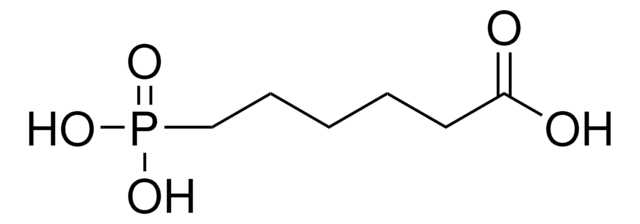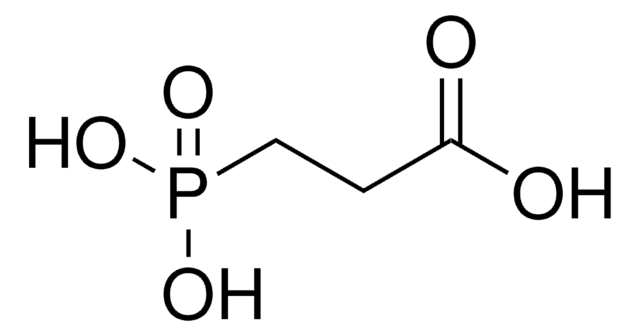737933
Butylphosphonic acid
Synonym(s):
n-Butylphosphonic acid
Sign Into View Organizational & Contract Pricing
All Photos(3)
About This Item
Empirical Formula (Hill Notation):
C4H11O3P
CAS Number:
Molecular Weight:
138.10
MDL number:
UNSPSC Code:
12352103
PubChem Substance ID:
NACRES:
NA.23
Recommended Products
form
solid
Quality Level
mp
98-102 °C
SMILES string
CCCCP(O)(O)=O
InChI
1S/C4H11O3P/c1-2-3-4-8(5,6)7/h2-4H2,1H3,(H2,5,6,7)
InChI key
UOKRBSXOBUKDGE-UHFFFAOYSA-N
Signal Word
Danger
Hazard Statements
Precautionary Statements
Hazard Classifications
Skin Corr. 1B
Supplementary Hazards
Storage Class Code
8A - Combustible corrosive hazardous materials
WGK
WGK 3
Flash Point(F)
Not applicable
Flash Point(C)
Not applicable
Certificates of Analysis (COA)
Search for Certificates of Analysis (COA) by entering the products Lot/Batch Number. Lot and Batch Numbers can be found on a product’s label following the words ‘Lot’ or ‘Batch’.
Already Own This Product?
Find documentation for the products that you have recently purchased in the Document Library.
Customers Also Viewed
Chung-Wei Yang et al.
Scientific reports, 7(1), 16910-16910 (2017-12-06)
The hydrothermal treatment followed by a self-assembled monolayer (SAM) of 1-butylphosphonic acid through the tethering by aggregation and growth (T-BAG) method was employed to produce protective surface coatings on the Mg-6Al-1Zn alloy (AZ61) for reducing the degradation rate in physiological
C Dumora et al.
The Biochemical journal, 280 ( Pt 2), 557-559 (1991-12-01)
The effect of n-butylphosphonic acid on the activity of phosphonoacetaldehyde hydrolase from Pseudomonas aeruginosa was investigated: at low concentrations this compound appeared as an activator of the enzyme activity, whereas at higher concentrations it exhibited inhibitory properties. The experimental results
N Amend et al.
Archives of toxicology, 94(6), 2239-2247 (2020-04-19)
Suicidal ingestion of organophosphorus (OP) or carbamate (CM) compounds challenges health care systems worldwide, particularly in Southeast Asia. The diagnosis and treatment of OP or CM poisoning is traditionally based on the clinical appearance of the typical cholinergic toxidrome, e.g.
Our team of scientists has experience in all areas of research including Life Science, Material Science, Chemical Synthesis, Chromatography, Analytical and many others.
Contact Technical Service















